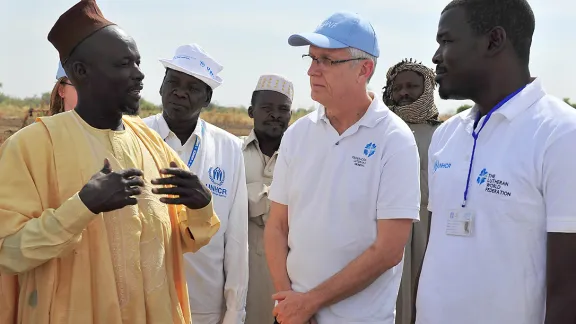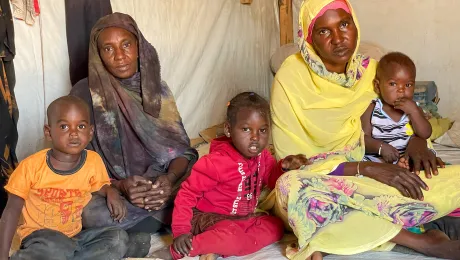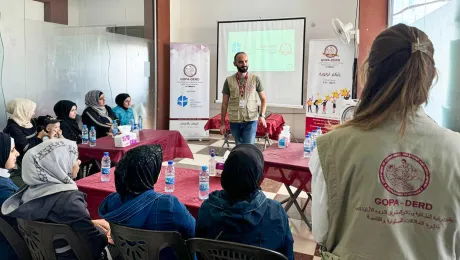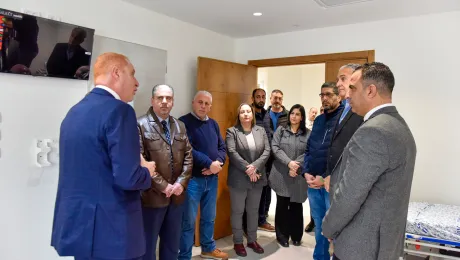
LWF General Secretary Junge met with the chief of Koutoufou village Adam Younouss, who provided the Seeds for Solutions project with land on which refugees from the Djabal camp and villagers from Koutoufou jointly farm. Photo: LWF/A. Danielsson
General Secretary Junge meets UN High Commissioner for Refugees, LWF partners and government officials in Chad
(LWI) – Collaboration is a key element in serving the people of Chad, Rev. Dr Martin Junge said during a visit there last week. The Lutheran World Federation General Secretary made these remarks following meetings in the capital N‘djamena and the Sila region with leaders of key LWF humanitarian and development work partners including the United Nations High Commissioner for Refugees (UNHCR) Filippo Grandi; officials of other UN agencies, national and local government representatives; non-governmental organization (NGO) actors; and members of the ACT Alliance.
“Together we achieve much more than we do alone,” Junge said after his seven-day familiarization with the work carried out by the LWF Country Program in Chad. “This will be ever more important as LWF Chad expands its work into the Lake Chad region, which is currently undergoing a humanitarian crisis.”
LWF Regional Program Coordinator for Central Africa, Susan Muis, who accompanied Junge, affirmed his words. “The overwhelming humanitarian and development needs in Chad call for strong partnerships, bringing together partners with their expertise to complement each other in service.”
Largest implementing partner of UNHCR
The overall situation of refugees in the world was the focus of the meeting between Junge and Grandi. The two leaders spoke of the strategic agreement between the LWF and UNHCR and took up specific aspects of the cooperation and ways of deepening engagement for refugees in the world. “As a faith-based organization the LWF brings operational capacity as seen in Chad, a global constituency and a moral voice grounded in faith, advocating for the protection of refugees and accountability to international laws that commit states to such protection,” Junge said.
The overwhelming humanitarian and development needs in Chad call for strong partnerships, bringing together partners with their expertise to complement each other in service.
The LWF is the largest implementing partner of UNHCR in Chad and is currently working in 12 of the 18 refugee camps and in 181 host villages in the country. Since 2014 LWF has been implementing the Seeds for Solutions project in collaboration with UNHCR and support from the United States Bureau of Population, Refugees and Migration. The partnership with UNHCR in Chad began in 2007 when the LWF started humanitarian work in the country.
Engagement with government authorities
Junge met national government officials, including the Secretary of State Barnabas Sing-Yabe and the Mr. Ahmat Djamaladine Mahamat, director of the department that deals with NGO affairs in Chad. In Goz Beida he held discussions with local government officials, including the Governor of Sila region to whom he expressed gratitude for support to LWF’s work, including negotiations to provide land that is jointly farmed by the refugees and host communities.
Diakonie Katastrofenhilfe (DKH), with which the LWF constitutes the Chad ACT Alliance forum was among several organizations and NGOs that Junge thanked. “The steady support of DKH has allowed the LWF to grow. The plans to move to the Lake Chad region will further strengthen LWF’s presence in Chad.”
In discussions with Catholic Relief Services, and referring to the Declaration of Intent signed by Caritas Internationalis and LWF World Service at the Joint Commemoration in Lund, Sweden, on 31 October, Junge emphasized that “this declaration needs to be expressed in concrete cooperation and joint work.”
Interfaith cooperation for peace
The visit provided an opportunity to meet officials of an inter-religious platform that brings together leaders from the Roman Catholic, Evangelical and Muslim communities. “I was very encouraged to hear about their joint workshops all over Chad,” Junge said, adding, “their joint presence among people traumatized by conflict, for instance in the south of the country, represents a starting point for a healing process and contributes to peace.”
Muis said the appreciation expressed by many for LWF’s presence in Chad during the visit confirmed the good work the LWF is doing in Chad. “We heard this from refugees, the Country Representative of UNHCR and government officials. That is a good message to hear, take with us, and it provides a solid basis for our continuing work in Chad.”


